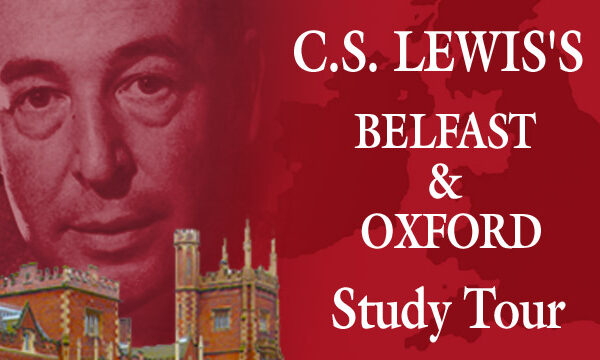Back to series

June 2018
In May 1945, C.S. Lewis published an essay in which he addressed a “case against prayer” which he believed had, “in the last hundred years, intimidated thousands of people.”1 An excerpt follows.
 The case against prayer (I mean the “low” or old-fashioned kind) is this. The thing you ask for is either good — for you and for the world in general — or else it is not. If it is, then a good and wise God will do it anyway. If it is not, then He won’t. In neither case can your prayer make any difference. But if this argument is sound, surely it is an argument not only against praying, but against doing anything whatever?
The case against prayer (I mean the “low” or old-fashioned kind) is this. The thing you ask for is either good — for you and for the world in general — or else it is not. If it is, then a good and wise God will do it anyway. If it is not, then He won’t. In neither case can your prayer make any difference. But if this argument is sound, surely it is an argument not only against praying, but against doing anything whatever?
In every action, just as in every prayer, you are trying to bring about a certain result; and this result must be good or bad. Why, then, do we not argue as the opponents of prayer argue, and say that if the intended result is good God will bring it to pass without your interference, and that if it is bad He will prevent it happening whatever you do? Why wash your hands? If God intends them to be clean, they’ll come clean without your washing them. If He doesn’t, they’ll remain dirty (as Lady MacBeth found) however much soap you use. Why ask for the salt? Why put on your boots? Why do anything?
We know that we can act and that our actions produce results. Everyone who believes in God must therefore admit (quite apart from the question of prayer) that God has not chosen to write the whole of history with His own hand. Most of the events that go on in the universe are indeed out of our control, but not all. It is like a play in which the scene and the general outline of the story is fixed by the author, but certain minor details are left for the actors to improvise. It may be a mystery why He should have allowed us to cause real events at all; but it is no odder that He should allow us to cause them by praying than by any other method.
Pascal says that God ‘instituted prayer in order to allow His creatures the dignity of causality’. It would perhaps be truer to say that He invented both prayer and physical action for that purpose…2
The argument that prayer is somehow unnecessary or doesn’t make any difference is antithetical to many passages in Scripture. If we allow ourselves to be influenced by it, our failure to pray may mean missed blessings both for ourselves and for other people for whom we could have prayed. James said, “You do not have, because you do not ask” (4:2, ESV). Let us be thankful for God’s gift of prayer and commit or recommit ourselves to spending daily time with God in prayer.
“Lord, teach us to pray…”
LUKE 11:1 (ESV)
1 C.S. Lewis, (“Work and Prayer” in God in the Dock (Grand Rapids: Eerdmans, 1998), p. 104.
2 Ibid, pp. 105-106 (footnote omitted).
 COPYRIGHT: This publication is published by C.S. Lewis Institute; 8001 Braddock Road, Suite 301; Springfield, VA 22151. Portions of the publication may be reproduced for noncommercial, local church or ministry use without prior permission. Electronic copies of the PDF files may be duplicated and transmitted via e-mail for personal and church use. Articles may not be modified without prior written permission of the Institute. For questions, contact the Institute: 703.914.5602 or email us.
COPYRIGHT: This publication is published by C.S. Lewis Institute; 8001 Braddock Road, Suite 301; Springfield, VA 22151. Portions of the publication may be reproduced for noncommercial, local church or ministry use without prior permission. Electronic copies of the PDF files may be duplicated and transmitted via e-mail for personal and church use. Articles may not be modified without prior written permission of the Institute. For questions, contact the Institute: 703.914.5602 or email us.
-
Recent Podcasts
The Side B Stories – Dr. James Tour’s story
by Jana Harmon, James Tour on April 12, 2024From a secular Jewish home, scientific scholar and...Read More
-
Why are Christians so Bad?
by Paul Joen on April 5, 2024
-
Questions That Matter Podcast – Dai Hankey and Gospel Hope for Weary Souls
by Randy Newman, Dai Hankey on April 5, 2024
-
Recent Publications
Isn’t Morality Relative?
by Christopher L. Reese on April 1, 2024It is widely accepted in the Western world...Read More
-
Do Muslims and Christians Worship the Same God?
by Andy Bannister on March 1, 2024
-
Artificial Intelligence and Its Impacts on Humanity
by John Lennox on February 13, 2024
0
All Booked
0.00
All Booked
0.00
All Booked
20599
GLOBAL EVENT: 2024 Study Tour of C.S. Lewis’s Belfast & Oxford
https://www.cslewisinstitute.org/?event=global-event-2023-study-tour-of-c-s-lewis-belfast-oxford-2&event_date=2024-06-22®=1
https://www.paypal.com/cgi-bin/webscr
2024-06-22

Next coming event
Days
Hours
Minutes
Seconds
GLOBAL EVENT: 2024 Study Tour of C.S. Lewis’s Belfast & Oxford
On June 22, 2024 at 12:00 pmat Belfast, Northern Ireland & Oxford, EnglandSpeakers

C.S. Lewis Institute
Author




